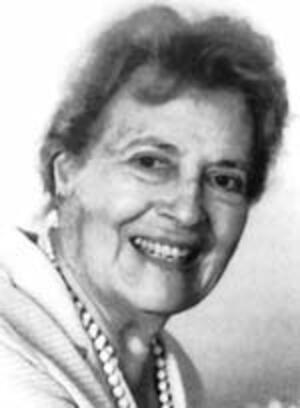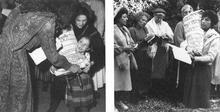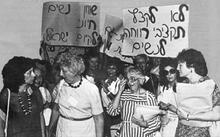Virginia Snitow
Ahead of her time in the fight for both civil rights and women’s rights, Virginia Snitow was unafraid to take unpopular stances when fighting for others. Snitow began working as a public school teacher in Harlem, inspiring her to join the Communist Party and travel to the Soviet Union. Though she left the Party in the 1940s, she remained committed to equality. Snitow then rose to become president of the Women’s Division of the American Jewish Congress in 1965, At the time, women outnumbered men in the AJC, and she resisted a vote to merge the two halves, fearing that women would lose their clout in a joint organization. Snitow also created US/Israel Women to Women, a major supporter of women’s rights projects in Israel.
For a million years I will blend
into earth and atmosphere
Identity gone—why worry about Who’s Who?
This opening stanza of a poem written by Virginia Levitt Snitow is only a whiff of a multifaceted woman who was a teacher, political activist, pre-Second Wave feminist, poet, writer and founder of US/Israel Women to Women. Though she was never motivated by a desire for fame, American and Israeli women who live in the twenty-first century are better off in their lives because of Virginia Levitt Snitow’s path-breaking activities. Passion combined with a refined intelligence made her a precursor of feminist thought and action.
Politically engaged until the end
Snitow was born in New York City on April 9, 1911, to Louis Levitt (Kiev 1874–New York 1960), a dentist, and Tillie (Toba) Rosenberg (Husi, Romania 1892?–New York 1959), both of whom had arrived in the United States as children. The couple had two other daughters, Beatrice Pomerance (b. 1912) and Sylvia Angus (1921–1982). Louis and Tillie were married in 1909 and divorced in 1952. In 1935, Virginia married Charles Snitow (1907–2000), an attorney who was also a trade show impresario. They had two children: Ann Barr Snitow (b. 1943), a Professor of English and Women’s Studies and Alan Mark Snitow (b. 1948), a filmmaker.
Snitow was active politically until the last few months of her life. She traveled alone to Israel in January 2000 to accept an award as a “woman who made a difference” given by the Israel Women’s Network and presented by the Deputy Speaker of the Israeli Lit. "assembly." The 120-member parliament of the State of Israel.Knesset. The speech from the podium of the Knesset was the last she gave; shortly thereafter she lost the ability to speak in her battle with amyotrophic lateral sclerosis (Lou Gehrig’s Disease).
Public school teaching and the Communist Party
Snitow began her career in the 1930s and 1940s as a New York City schoolteacher at a public girls’ school in Harlem (Wadleigh). She wrote a well-known piece about her work entitled “I Teach Negro Girls,” which was published in the New Republic on November 9, 1942.
The teaching experience in Harlem radicalized her. She became active in the New York City Teachers Union and joined the Communist Party, traveling to the Soviet Union in 1936. Her seniors in the party did not want her to go, apparently fearing she would be disillusioned, but her naiveté survived the experience and it was not until the mid-1940s, when sectarianism beset the party, that she left it.
Involvement with the AJC
Although she was disillusioned by party politics and the USSR, she held fast to a series of political commitments. In particular, she became an early feminist, teaching suburban women how to research and speak on political and social issues in the 1940s and 1950s. This work, performed through the American Jewish Congress, was so effective that she became President of AJC Women’s Division in 1965 and was re-elected the maximum two times. At the time, Women’s Division had far more members than the male side of the organization. As President, she drove AJC to oppose the war in Vietnam, making it the first major Jewish organization to do so.
Although her final battles at AJC were on the losing side, they consolidated her feminist commitments within the Jewish community. She fought against an effort to disband the Women’s Division and merge it with the overall group—a proposal generated by the view that, with the rise of feminism, there should not be two separate entities. Virginia thought exactly the opposite. She felt the disbanding was an effort to gut the growing power and influence of the women’s side, and she was a strong proponent of women’s autonomous self-organization.
US/Israel Women to Women, and other legacies
The upshot of the dispute was her founding, in 1979, of US/Israel Women to Women, the catalyst for which was a call for help from a battered women’s shelter in Israel. The center was about to close its doors for lack of funds and the women sheltered there were afraid for their lives. Virginia called together a group of women she knew, most them people she had worked with at AJC, and raised the money to keep the shelter going.
US/Israel Women to Women went on to become the most active American supporter of women’s rights in Israel, setting up women’s studies program at four Israeli universities, supporting battered women’s shelters for Jewish and Arab Israeli women, funding court challenges to various legal restrictions on women, creating a support network for Noga, the major Israeli feminist magazine, and establishing the Virginia L. Snitow Lecture Series to educate the public about feminism and politics. Now in the third decade of its existence, US/Israel Women to Women remains the main US supporter of women’s projects in Israel.
The recipient of many awards, Snitow was deeply committed to political action, including civil rights activity and support for affirmative action. She was also a pioneer advocate for women’s power. In the 1950s she wrote key articles against nuclear testing and fallout. Her article “The Mushroom Cloud,” published in the Western Political Quarter in 1958, was reprinted many times. In 1968 Snitow was a Eugene McCarthy delegate to the Democratic National Convention. In 1972 she was an alternate delegate for Senator George McGovern. As the president of the Women’s Division of the American Jewish Congress, she attacked the “women’s pages” as a ghetto. Ambassadors, members of Congress and writers for women’s pages jumped to their defense, but Virginia never wavered because she understood that women’s issues were human issues.
It used to be said that behind every great man there is a woman. In a poem titled: “To My Husband on His Eighty-Ninth Birthday,” Virginia wrote:
So young to have chosen him
What could I foresee?
I could not have foreseen
What he turned out to be:
A companion and my lover forever.
Virginia Levitt Snitow supported the empowerment of women and to the very end Charles empowered her. She died on October 16, 2000, at her home in Scarsdale, New York.
The Western Political Quarterly, 1958.
Ann Snitow has desktop published a book of her mother’s poems: Poems And Sayings by Virginia Levitt Snitow, 2000, second edition.
Ann is editing a collection of her complete stories, articles and speeches: Confrontations of a Quiet Woman.
For copies: Contact e-mail: newwny@igc.org.





